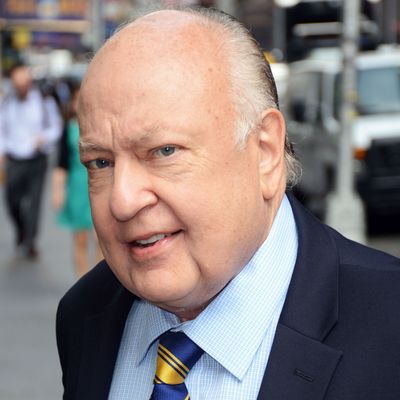
At the start of his career, not long after he helped Richard Nixon win the 1968 election, Roger Ailes boasted to a reporter that television would one day replace the political party as the most powerful force in American politics. If there is any doubt that the Fox News founder has largely made that prediction come true, it should be erased by the panic that next week’s Fox debate is stoking inside the GOP. In a year that features the largest primary field in modern history — not to mention Donald Trump as a front-runner — campaign strategists worry that Ailes’s debate, which is likely to attract the biggest audience in cable-news history, could define the race more than five months before the first votes are cast.
As everyone knows by now, Fox has said that only 10 of the 17 declared candidates will be allowed onstage for the prime-time debate moderated by Megyn Kelly, Bret Baier, and Chris Wallace at the Quicken Loans Arena in downtown Cleveland. (The remaining candidates will participate in a one-hour debate at 5 p.m. that is being dubbed by some as the kiddies’ table). Contenders for each event will be selected on August 4 from an average of five national polls chosen by Fox. But which polls the network will use remains an open question and a source of controversy.
The candidates with the most on the line are Rick Perry and John Kasich. As things stand now, both are in contention to land the tenth and final prime-time spot, depending on which polls are averaged. According to sources, advisers for both Kasich and Perry have been calling Fox trying to find out which polls Fox is considering and how they will break a tie. “We don’t know what methodology they’re going to use. We’ve been asking the question and they haven’t shared,” says a Kasich adviser who, like all campaign sources I spoke with, agreed to speak on background for fear of angering Ailes. (Fox spokesperson Irena Briganti did not respond to requests for comment.)
In the absence of a clear answer from the network, advisers for both Kasich and Perry have taken to lobbying Ailes and Fox executives to use polls that put their guy over the line. One person close to the Perry campaign told me that GOP fund-raiser and Ailes friend Georgette Mosbacher recently called Ailes on behalf of the former Texas Governor. Other strategists cautioned that selling Ailes too aggressively could backfire. “Anyone who knows Roger knows that ain’t gonna work,” a longtime operative said.
The thinking among the strategists I spoke with is that Ailes faces conflicting impulses when it comes to choosing Perry or Kasich. On the one hand, Ailes is certainly hoping to produce the best television, which would give the unpredictable Perry the advantage. “People will want Perry in just because of the ‘oops’ factor,” one GOP media adviser said, referring to Perry’s infamous brain freeze from 2012. Others stressed Kasich’s close relationship with Ailes, an Ohio native. Before getting back into politics, Kasich hosted a weekly Fox show. “Roger likes Kasich,” a Fox insider told me. “Plus Roger knows it’ll look awful if the sitting governor isn’t on that stage.”
For the campaigns that do make prime time, there’s another wild card: Trump. Fox told campaigns this week that the candidates will be lined up onstage according to their poll numbers, with the leader in the center and the others to his left and right. That means if current numbers hold, Trump will be in the center flanked by Jeb Bush and Scott Walker. “There’s a lot of nervousness about where he’s going to be placed and who will be next to him,” one adviser said. In any normal debate, candidates would obviously fight to be in the middle, but being center stage next to Trump could be as much of a liability as an advantage. Who knows what he might do? “It’s almost like you don’t want to be too close,” one campaign adviser says, “in case he self-combusts.”
The debate format itself has been a subject of speculation. This week, Fox’s VP of News, Bill Sammon, held conference calls with campaigns to inform the candidates about the rules, according to one source on a call. Sammon told campaign officials that candidates will not be allowed to make opening statements; they’ll have one minute to respond to questions from moderators; and if a candidate calls out another by name, that candidate will get 30 seconds to respond to the attack. If time allows, there will perhaps be closing statements.
Inside Fox, the debate is generating controversy among Ailes’s senior ranks. “There’s total confusion about all of it. The Second Floor is making it up as they go along,” one Fox personality told me, referring to Ailes’s executive suite. According to sources, Fox executives are still undecided about which polls to use and who will be allowed on the stage. This week, for example, Fox amended an earlier rule that a candidate had to be polling above one percent to participate after it became clear that Lindsey Graham, Carly Fiorina, and George Pataki wouldn’t even make the 5 p.m. event. There’s also unease among some that Trump will likely get a starring role. “The problem is he’ll act like it’s his show,” another Fox personality told me.
Even inside Fox, some are awed that a presidential race is being influenced by a television channel. “Crazy stuff,” another personality told me, “you have a TV executive deciding who is in — and out — of a debate!”





























